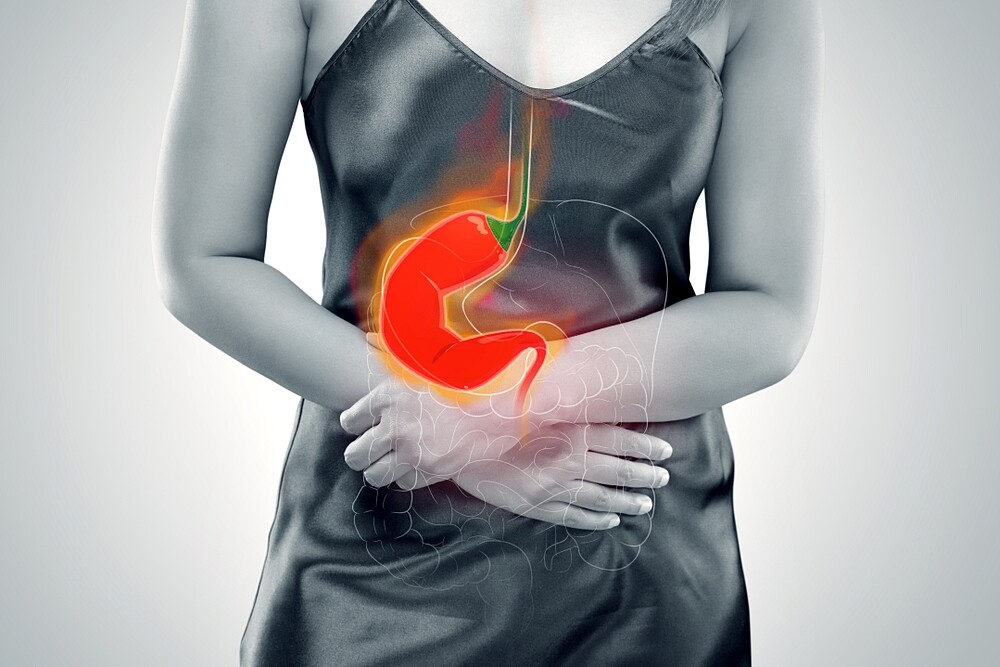In so-called reflux, gastric acid runs back into the oesophagus, which can cause unpleasant symptoms. We explain the causes and what helps.
What is a reflux?
In reflux (“gastroesophageal reflux disease”) the acidic stomach contents run back into the oesophagus to an excessive degree, which can lead to heartburn, among other things. Currently, about one in five Germans suffers from reflux. The cause is usually a disorder of the so-called esophageal sphincter muscle, which no longer seals the esophagus to the stomach properly. With the help of medication and an appropriate diet, the symptoms of reflux can often be well controlled.
Reflux: When stomach acid suddenly hurts us
Actually, our stomach acid has a very practical function: with its low pH value between 1 and 4, it helps in the decomposition and digestion of food. Thanks to a special protective layer, it cannot damage the stomach either. However, if it gets back into the oesophagus through a reflux, it attacks the mucous membrane there and causes complaints. Especially when bending or lying down, reflux can easily occur if the sphincter muscle of the oesophagus no longer works properly. If the problem remains untreated, an inflammation with a change in the mucous membrane can develop, which is very painful.
Causes and variants of reflux disease
There are different variants for reflux:
- Reflux without mucous membrane changes (non-erosive gastroesophageal reflux disease = NERD)
- Reflux with mucous membrane changes (erosive reflux disease = ERD)
A distinction is also made between primary and secondary reflux:
- Primary reflux: The most common form of the disease. The cause is still largely unclear, but in this variant the sphincter muscle can no longer fulfil its function, or only to a limited extent. It is known that diet plays a major role in the development of the symptoms. But diaphragmatic weakness or diaphragmatic hernia also increase the risk of primary reflux.
- Secondary reflux: The rarer form of reflux occurs mainly due to physical changes (e.g. pregnancy) or as a result of other diseases of the digestive system, such as a narrowing of the stomach outlet or a stomach tumour.
What symptoms can reflux cause?
As the oesophagus can be damaged by reflux in the long term, it is important to recognise typical symptoms of the disease and to see a doctor promptly. These include:
- Heartburn
- Belching of air or gastric acid, both into the oesophagus and the mouth
- Feeling of pressure or pain behind the sternum
- Bad breath (when belching)
- Swallowing difficulties
- Cough
- Airway damage
- Damage to the enamel
Symptoms in babies and toddlers
Even babies and small children can already suffer from reflux. With them you can recognize it by the fact that they have difficulties in drinking or eating. Babies are very restless, scream a lot and overstretch their head, toddlers have to throw up more often after eating.
Treatment: What helps against reflux?
In addition to medications that inhibit acid production, adjustments to one’s own lifestyle also help to get the reflux under control. The following measures are useful:
- Loose fitting clothes: No matter if trousers or skirts – clothes should fit loosely on the stomach. If they are too tight, they increase the pressure in the abdominal cavity, making it easier for the stomach contents to enter the oesophagus.
- Movement: At least two or three times a week we should exercise for at least 30 minutes each time.
- If you are overweight: Losing weight can alleviate the symptoms.
- Sleeping position: Patients sleep best with slightly raised upper body and left side, so that gravity can prevent reflux.
- Nutrition: The reflux is often accompanied by general digestive disorders. It makes sense to eat a protein-rich diet – proteins stimulate the production of the peptide hormone gastrin, which increases the muscle tension of the sphincter muscle of the esophagus. In general, patients are better off eating several small portions spread over the day, which should be low-carb and low-fat if possible. The last meal of the day is best eaten a few hours before bedtime. Luxury foods such as alcohol and nicotine should at best be avoided completely.
- Chamomile Tea: Camomile has an anti-inflammatory effect and can reduce the production of stomach acid.
Operation for reflux
If the drug treatment of the reflux does not work, in some cases surgery may be useful. In this case a cuff is formed from the upper part of the stomach and fixed around the lower end of the esophagus. This should stabilize the esophageal sphincter and prevent the acid reflux.

